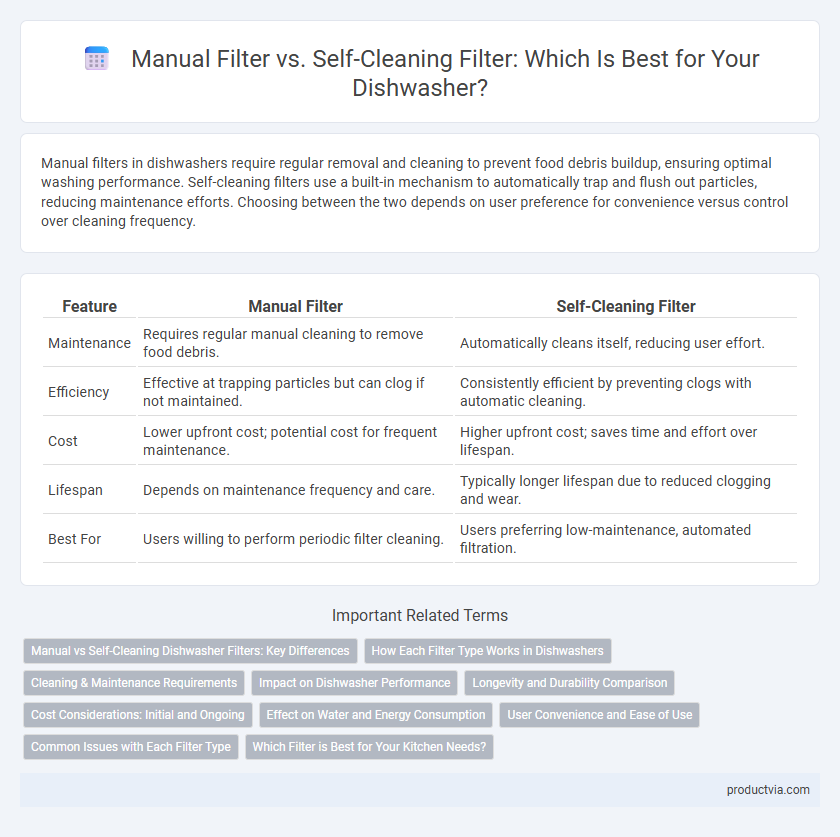Manual filters in dishwashers require regular removal and cleaning to prevent food debris buildup, ensuring optimal washing performance. Self-cleaning filters use a built-in mechanism to automatically trap and flush out particles, reducing maintenance efforts. Choosing between the two depends on user preference for convenience versus control over cleaning frequency.
Table of Comparison
| Feature | Manual Filter | Self-Cleaning Filter |
|---|---|---|
| Maintenance | Requires regular manual cleaning to remove food debris. | Automatically cleans itself, reducing user effort. |
| Efficiency | Effective at trapping particles but can clog if not maintained. | Consistently efficient by preventing clogs with automatic cleaning. |
| Cost | Lower upfront cost; potential cost for frequent maintenance. | Higher upfront cost; saves time and effort over lifespan. |
| Lifespan | Depends on maintenance frequency and care. | Typically longer lifespan due to reduced clogging and wear. |
| Best For | Users willing to perform periodic filter cleaning. | Users preferring low-maintenance, automated filtration. |
Manual vs Self-Cleaning Dishwasher Filters: Key Differences
Manual dishwasher filters require regular removal and cleaning by hand to prevent clogs and maintain performance, while self-cleaning filters use a built-in mechanism to automatically trap and wash away food particles during the wash cycle. Manual filters often provide more thorough debris removal but demand consistent user maintenance, whereas self-cleaning filters offer convenience and less frequent upkeep with potentially lower filtration efficiency. Choosing between manual and self-cleaning dishwasher filters depends on user preference for hands-on maintenance versus automated cleaning.
How Each Filter Type Works in Dishwashers
Manual filters in dishwashers trap food particles and debris during washing, requiring users to remove, rinse, and reinstall the filter regularly to maintain performance. Self-cleaning filters use a fine mesh screen and a grinding mechanism to continuously break down and flush away food residues, minimizing clogging without manual intervention. Both filter types play crucial roles in preventing drainage issues and ensuring efficient water circulation within the dishwasher.
Cleaning & Maintenance Requirements
Manual filters in dishwashers require regular removal and rinsing to prevent food particle buildup and ensure optimal performance, demanding consistent user attention. Self-cleaning filters utilize a built-in mechanism to automatically trap and flush debris, reducing maintenance frequency but may still need occasional inspection to avoid clogging. Choosing between these filters impacts the dishwasher's cleaning efficiency and user involvement in upkeep.
Impact on Dishwasher Performance
Manual filters require regular cleaning to prevent clogging, ensuring optimal water flow and consistent washing performance in dishwashers. Self-cleaning filters reduce maintenance efforts by automatically removing debris, but may be less effective at trapping fine particles, potentially affecting long-term cleaning efficiency. Proper filter choice directly influences dishwasher performance, energy consumption, and lifespan by maintaining efficient water circulation and preventing buildup.
Longevity and Durability Comparison
Manual filters in dishwashers often require regular cleaning to maintain optimal performance but tend to offer greater durability due to simpler construction and fewer mechanical parts. Self-cleaning filters use automated mechanisms to reduce maintenance frequency, yet their moving components may wear out faster, potentially limiting overall longevity. Choosing a manual filter can enhance long-term reliability, while self-cleaning filters offer convenience at the possible cost of reduced lifespan.
Cost Considerations: Initial and Ongoing
Manual filters in dishwashers generally have a lower initial cost, making them an affordable option for budget-conscious buyers. However, they require regular maintenance and occasional replacement, leading to ongoing expenses over time. Self-cleaning filters come with a higher upfront price but reduce long-term operational costs by minimizing the need for manual cleaning and filter replacement.
Effect on Water and Energy Consumption
Manual filters in dishwashers require regular cleaning to maintain optimal water flow and prevent blockages, which can help reduce water usage by ensuring efficient rinse cycles. Self-cleaning filters continuously remove debris without user intervention, promoting consistent energy efficiency by reducing the strain on the dishwasher's pump and heater. Choosing a self-cleaning filter often leads to lower water and energy consumption due to improved filtration and less frequent maintenance.
User Convenience and Ease of Use
Manual filters in dishwashers require regular user intervention to remove food debris, offering straightforward maintenance but demanding consistent attention. Self-cleaning filters automatically grind and flush particles, significantly reducing user effort and enhancing convenience. Choosing a self-cleaning filter improves ease of use by minimizing manual cleaning, making it ideal for busy households.
Common Issues with Each Filter Type
Manual filters in dishwashers often face clogging due to food debris accumulation, requiring regular cleaning to maintain performance and prevent odors. Self-cleaning filters can suffer from mechanical failures or blockages in the rinse system, leading to ineffective debris removal and potential buildup over time. Both filter types may cause drainage problems if not properly maintained, impacting the dishwasher's overall efficiency and cleanliness.
Which Filter is Best for Your Kitchen Needs?
Manual filters in dishwashers require regular cleaning by hand, offering precise control over debris removal and preventing clogs efficiently. Self-cleaning filters use automated rinsing cycles to reduce maintenance time, ideal for busy kitchens but may be less effective with heavy food residue. Choosing the best filter depends on kitchen usage frequency, the amount of food waste generated, and the user's preference for convenience versus thorough cleaning control.
Manual Filter vs Self-Cleaning Filter for Dishwashers Infographic

 productvia.com
productvia.com